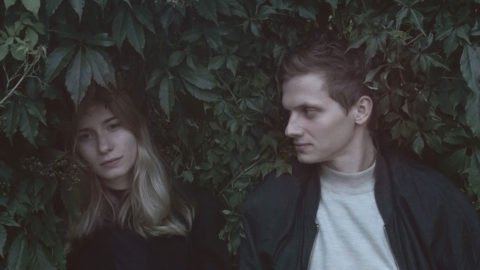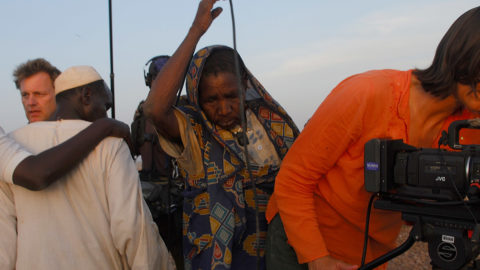Film of the Week: All These Sleepless Nights
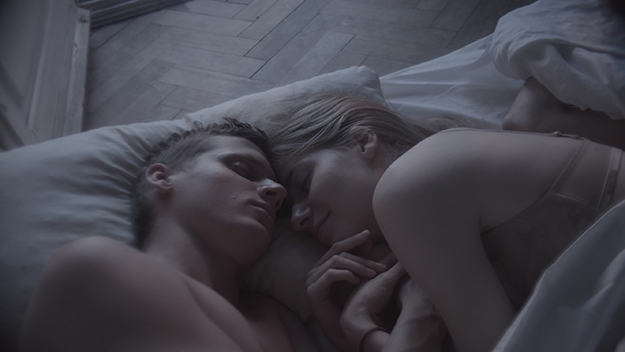
In her 2008 book The Years, the French writer Annie Ernaux evokes the feeling experienced by a woman waking up in mid-afternoon after a post-coital snooze with her lover, and experiencing the return of many other moments in her life, from childhood on, when she similarly found herself waking from afternoon slumber. All those impressions become somehow simultaneous in her mind, as if they had all been written on top of each other. There’s a similar phenomenon at work in Michal Marczak’s film All These Sleepless Nights which is, for the most part, an evocation of many sleepless nights—and a few restless days—all run together and becoming somehow barely distinguishable from each other.
The difference between Marczak’s form of memory and Ernaux’s is that, where hers covers instances from an entire life, All These Sleepless Nights crams together a host of similar experiences from just one year in its protagonist’s existence. At the start of the film, over an aerial view of Warsaw at night, the sky lit up by fireworks, Krzysiek (Krzysztof Baginski)—a single man in, presumably, his early twenties—tells us in voiceover about the theory that, if you ran together each of the different types of experience you had known in an entire life, then “you’d end up staring at fireworks for four days straight… Sex would take up seven months… [You’d have] 51 days of deciding what to wear… 700 days of waiting for something to happen.”
In some ways, All These Sleepless Nights feels like 100 minutes of waiting for something to happen: it’s probably just as well that we get only a year’s worth of Krzysiek’s life, and then just a compilation of the briefest highlights. And yet something is happening all the time, and fairly frenetically for the most part—even though the frenzy often feels paradoxically like the numb stasis often associated with youthful hedonism, at least in movies. This is one of those films about that gilded—or arguably, accursed—period of youth during which events seem to zoom by in a headlong rush, although it may feel to the subjects of this experience that nothing is really happening at all. Polish director Marczak (Fuck for Forest, 2012) has made a statement here about a sort of transitional “bubble” moment of life, when the adult self is not yet fully formed, or not yet rigidified into stable identity—a moment at which anything seems possible, although little either memorable or decisive might actually appear to be happening.
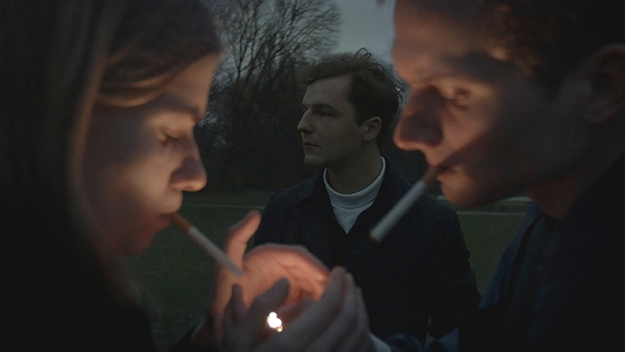
Krzysiek and his friend Michal (Michal Huszcza) certainly have crammed schedules—endless nights of clubbing, much drunken or stoned flânerie, the odd tentative romance or inconclusive hook-up—yet there’s little in their timetable that can be conventionally classified as “event” or that has much narrative consequence. But if their experiences all come across as heightened, it is possibly because they all come from what a phase that the film’s opening caption tells us is called the “Reminiscence Bump”: our minds tend to retain more memories from adolescence and early adulthood than from any other period. So whatever happens in this year of Krzysiek’s life is liable to mark him more deeply than many of the substantial life events he will live through later.
His is, in any case, an eventful and intensely sad year. At the start of the film, Krzysiek gets the brush-off from his girlfriend Monika. He then moves in with his friend Michal, a rakish smoothie with a penchant for white polo necks. They and their circle spend many nights walking round town drunkenly and foggily philosophizing, a recurrent theme being that their lives seem strangely fake or unreal; we’re witnessing the same educated post-teens existential angst that has been current on film, in literature, in art school drinking dens, since the 1950s at least. As short scenes cascade by in the film’s briskly edited episodic structure, we lose all sense of what’s happening when, any clear measurement of duration. These characters are not necessarily stoned at any given point, but seem somehow high on the sheer elasticity of time.
Krzysiek attends raves and parties, sometimes alone, sometimes with friends; he meets various people, apparently all nonprofessionals simply being themselves, who wander in and out of the action, occasionally connecting with him for brief moments. At one point, he and Michal meet two drunks in a bar, and a brief tussle erupts. It’s a rather horrifying sight—these two arrogant, presumably well-heeled young rakes flaunting their sense of social superiority over two working-class older men. “We’re your worst nightmare,” Michal flings at his opponents, and he and Krzyciek are indeed that—not because they’re “the happiness you’ve never known,” as Michal boasts, but because they’re exactly the kind of narcissistic brats you hope never to meet on a night out.
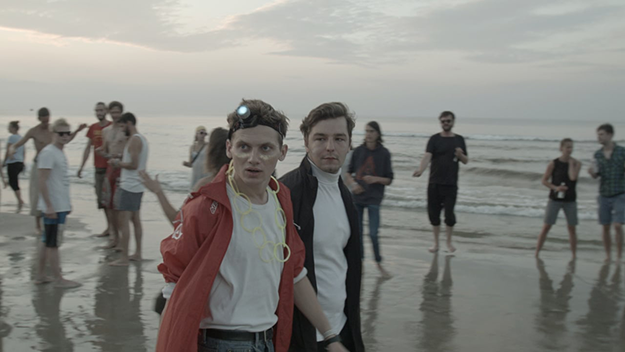
Various young women pass through Krzyciek’s world. One is Kaya, with whom he walks in the street one drunken dawn with eyes closed, at the risk of getting run over—something that feels like a very French New Wave gesture of dandyish rebel recklessness. Another is Natalia, who spends a night flirting with him at a rave, then makes it clear that she has other plans when morning comes. Above all there’s Eva (Eva Lebuef), a goofy beauty, a supremely talented show-off, and a class act who’s seemingly way out of Krzyciek’s league. Ostensibly Michal’s date, she cozies up to Krzyciek, drunkenly babbling about feelings and cigarettes; they go to a museum together and she performs a droll riff, pretending to sell him antiquated computer equipment; she even does the old “sexy nurse” routine for his cameraphone. Later, she earns her badge of Nouvelle Vague affiliation by translating for Krzyciek the lyrics of Françoise Hardy’s loner-in-the-crowd lament “Tous les Garçons et les Filles” (“All the Boys and Girls of My Age”).
The film’s breathless rush slows down when the couple get together, enough to accommodate a rare still moment when they are seen clinging together in bed. It seems perfect—and it can’t possibly last. Before you know it, Krzyciek has lapsed into unexplained melancholia, and Eva is gone. More fazed, swimmy nights follow, and occasional moments that signify the aimless solitude of it all—notably, a shot of Krzyciek staggering down a road in winter, sparse snowflakes signifying… who knows? Perhaps that we’re all solitary snowflakes really, all our seemingly significant moments liable to melt away into oblivion. Or perhaps it just looks cool.
There are definitely moments in the film that seem primarily to be about a certain brand of moody cool—which is not to accuse the film itself of being mere posture, since posing is exactly what its characters are consciously doing. Early on, Krzyciek wonders, “Does it all come down to acting? An ability to create a more spectacular version of yourself?” Very often you wish Krzyciek and his friends would just calm down and be themselves. Yet it’s in the nature of the film that they can’t, because the people we see are constantly conscious of the camera’s presence. All These Sleepless Nights straddles fiction and documentary in a number of ways. One is that the background to the action is a series of real events—the actual parties and raves to which Marczak takes his camera. Another is that, since the characters share the names of the actors, we appear to be seeing real people just being themselves, in a fictionalized portrait of a real generation.
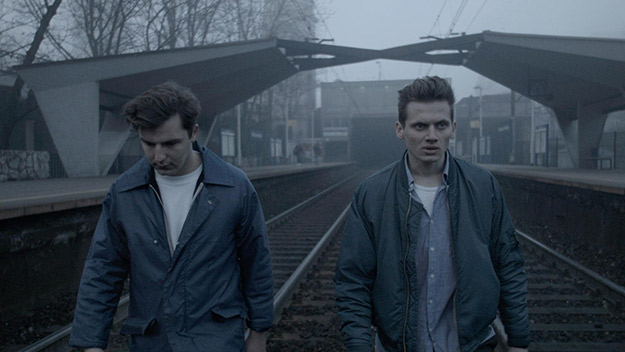
The leads are indeed performing: Baginski and Huszcza are in fact students of performance art, pupils of the leading Polish artist Miroslav Balka. The stunts and gestures they pull for the camera’s benefit in the streets of Warsaw are a form of performance art: notably, a great shot in which Krzciek walks through a traffic jam, in the opposite direction to all the stalled cars and their perplexed drivers. A super-mobile camera—Maciej Twardowski and Marczak himself share DP credits—constantly wheels around the characters or sways woozily alongside them, deepening the film’s sometimes overpowering sense of immersiveness. Shooting with wide lenses, Marczak had a camera rig especially created in order to stay dead close to his characters, so much so that often the camera seems practically to be nudging them.
The film does start to feel deeply oppressive after a while—as does the sense of directionlessness. It was only about an hour in that I realized I had no idea what Krzysiek and Michal actually do in life, but to all intents and purposes they don’t actually do anything, just vaguely live, in a kind of neo-beatnik swirl. The film’s evocation of life lived by night, and trudged through by day, has something of the same heightened intensity that you find in (to name some recent films about youth, in very different registers) Sebastian Schlipper’s Victoria, Mia Hansen-Løve’s Eden, and the underrated films of French director Mikhaël Hers (This Summer Feeling, Primrose Hill) which are dedicated to a more contemplative version of nocturnal drifting than Marczak’s.
Toward the end of the film, the characters try to make sense of what we’ve seen. “For me,” says Krzysiek’s friend Adam, “this year was a complete failure.” More hopefully, he adds, “There is no point in clinging to moments that come and go. We all have an archive of beautiful moments in our minds, and we can always reach in there.” Krzysiek replies, “I’ve been collecting these moments, but in a random way. I don’t have time to organize them—let alone act on them.” He shouldn’t worry—organizing them, as we think about the film, will be our job as viewers.
Against expectation, Marczak and Krzysiek do in the end draw meaning, closure, and even hope from this mass of event—with Krzysiek pulling off a piece of performance that raises the film’s bleary tone considerably. Dressed in a pink rabbit suit, Krzysiek serenades walkers in a park with a song about lost love and memory, then hails other passersby, who sometimes call back—real people, presumably, caught impromptu by Marczak’s camera as it floats along with them. We can’t quite tell whether this is a moment of happy release or breakdown for Krzysiek—who in any case is soon seen again dancing alone in traffic. Still, he’ll look back on it all one day and laugh. Or cry.
Jonathan Romney is a contributing editor to Film Comment and writes its Film of the Week column. He is a member of the London Film Critics Circle.



